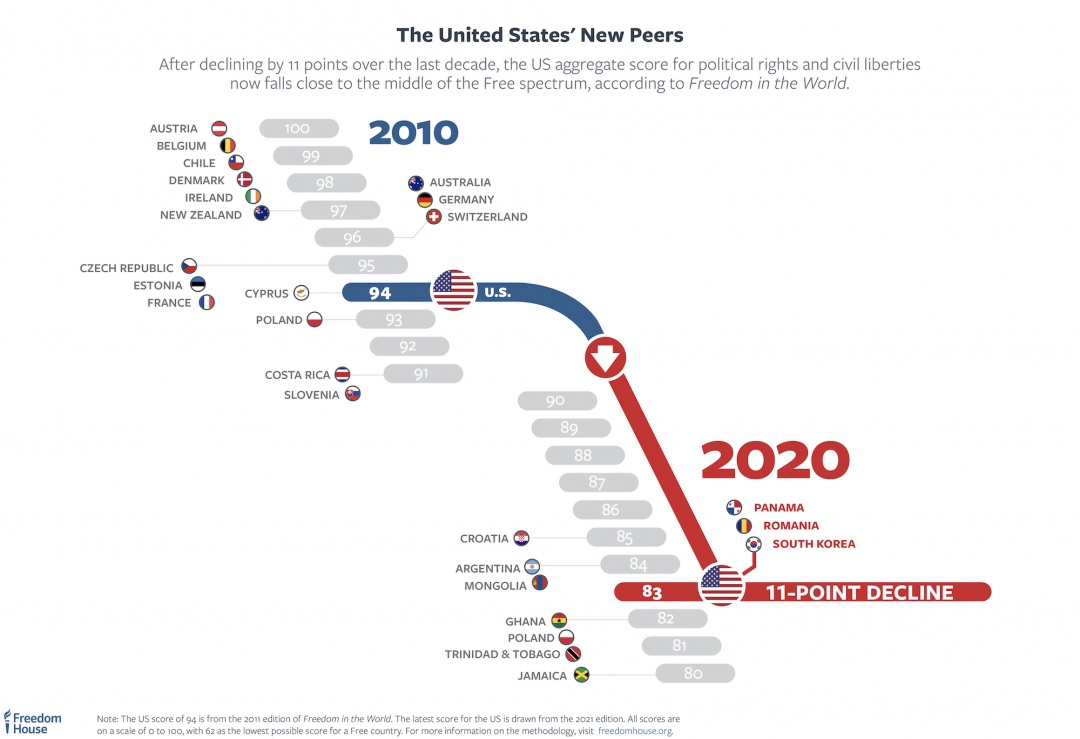U.S. Democracy in Crisis, in Urgent Need of Repair
The United States is "facing an acute crisis of democracy," precipitated by efforts to overturn the 2020 presidential election, stated Freedom House in a special report. In its latest annual report, Freedom House gave US democracy a score lower than most western countries.

Graphic from Freedom House special report on U.S. democracy
The United States is "facing an acute crisis of democracy," brought on by former President Donald Trump's efforts to overthrow the 2020 elections and the January 6th attack on the U.S. Capitol by a violent mob of Trump supporters, stated Freedom House in a special report issued earlier this year, "From Crisis to Reform: A Call to Strengthen America’s Battered Democracy."
Freedom House, which was founded to combat fascism in 1941, has been assessing the level of freedom in each country in the world, with a numerical score since 1973. Prior to the special report (and the sacking of the Capitol), in its latest annual "Freedom in the World" report issued at the end of 2020, Freedom House gave US democracy a score of 83. While still in the "free" category (as opposed to "partly free" or "not free"), 83 is lower than past ratings and significantly lower than western European countries and Canada.
Noted the special report: “...the crisis did not arise suddenly from an otherwise healthy political environment. U.S. democracy is in urgent need of repair.”
Freedom House identified three long-standing vulnerabilities that had been weakening U.S. democracy long before Trump attacked the press and the courts, and rejected Congressional oversight and safeguards against corruption. Those three vulnerabilities, according to the special report, are: "unequal treatment for people of color, the improper influence of money in politics, and partisan polarization and extremism."
As to the influence of big-money interests in politics, court rulings and legal loopholes permit unlimited political contributions -- overwhelming and shutting out individual voters as elected representatives cater to their donors. According to the special report, Trump exacerbated improper influence by appointing people to regulate areas in which they had a financial interest, and facilitating special interest groups. States the special report:
There is a widespread perception among Americans that our democracy is failing to address society’s most pressing problems, and that elected representatives are inaccessible to those without deep pockets or elite connections. People sense a disconnect between themselves and the politicians who make decisions affecting their lives, and the news dominating Washington often seems to hold little relevance for individuals' day-to-day concerns.
Partisan polarization splits the country along racial, ethnic and religious identities into red (Republican) and blue (Democratic). With little chance for third parties to prevail, space opens for radicalization. And according to the special report, partisan gerrymandering has a particularly corrosive and radicalizing effect on US politics.
Compared to Other Nations
While still in the "free" category (as opposed to "partly free" or "not free"), 83 is lower than past ratings and significantly lower than western European countries (in the mid- to high-90s) and Canada at 98.
As to improper influence in politics, in its "Freedom in the World" annual survey, Freedom House has scored the U.S. lower than all other large, established democracies except for Italy.
According to the special report:
the specific character of US political polarization is particularly damaging to democracy when compared with other countries. While many democracies feature sharp debate and ideological competition between left and right, partisan affiliation in the United States has also become more closely tied to racial, ethnic, and religious identity. This makes it far more difficult for parties to gain supporters through attraction and persuasion….